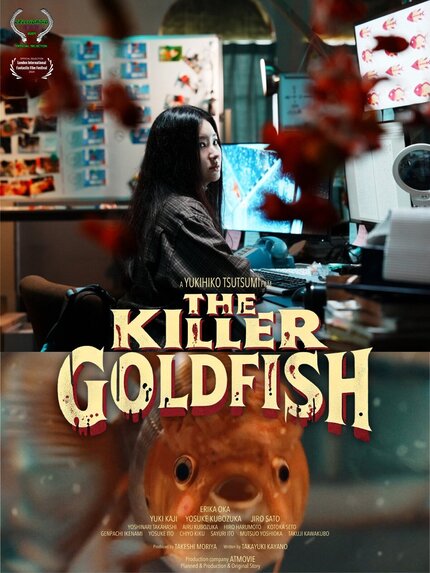London Fantastic 2024 Review: THE KILLER GOLDFISH

This last week London International Fantastic Film Festival kicked off its inaugural edition with Tsutsumi Yukihiko genre mashup extravaganza, The Kiler Goldfish. The filmmaker, perhaps best known for his intense tale of neighborly discord 2LDK, has expanded his scope with his latest feature, placing the world in peril from the titular goldfish, mutant assassins, and revisionist anthropology in a wacky conspiratorial action fantasy that may just hit the spot for adventurous viewers.
It's 2024 in Japan and a series of mysterious deaths have baffled the authorities. These killings don’t seem to have much in common apart from trashed apartments and the presence of unusual goldfish often embedded in the walls of the victims’ habitations. As the detectives assigned to the case start to uncover stranger and stranger evidence, the conspiracy surrounding these deaths broadens to threaten global consequences if the mystery isn’t solved.
Director Tsutumi’s original story takes flight as part of the initial project from the Japanese collective Super Sapienss, a group of influential and prolific filmmakers from the 21st century looking to create something new for audiences in the current age. While some fans – myself included – might know Tsutumi best from 2LDK, he has another major credit that will ring a lot of bells for manga fans, the epic 2008 adaptation of 20th Century Boys, a kind of Japanese answer to Indiana Jones, but with far more esoteric ambitions.
The Killer Goldfish, though proudly low budget on its surface, definitely leans more toward the aspirations of 20th Century Boys than Tsutumi’s earlier work. To be frank, this might not be the most expensive movie Japan has ever made, but it can surely stake a claim to be the MOST movie Japan has ever made, if we are measuring in terms of ambition vs. budget. There is so much happening in The Killer Goldfish that it would be easy to lose track of the basic plot, but because of this, the film doesn’t leave much room for the audience to get bored, which is a blessing.
While the core story – detectives investigate a series of mysterious deaths – never leaves Tsutumi’s focus, the story around this nucleus grows exponentially with every passing minute. Does it always make sense? No, not by a long shot. However, it never fails to engage the curiosity of the viewer, and with a defiantly indie feature like this, that’s a victory in itself.
The Killer Goldfish hearkens back to a time when Asian and Japanese independent cinema were in the zeitgeist of film fandom. Audiences in the early ‘00s would eat this film up, the question is whether today’s viewer is as curious as those of days gone by. I certainly hope so.







